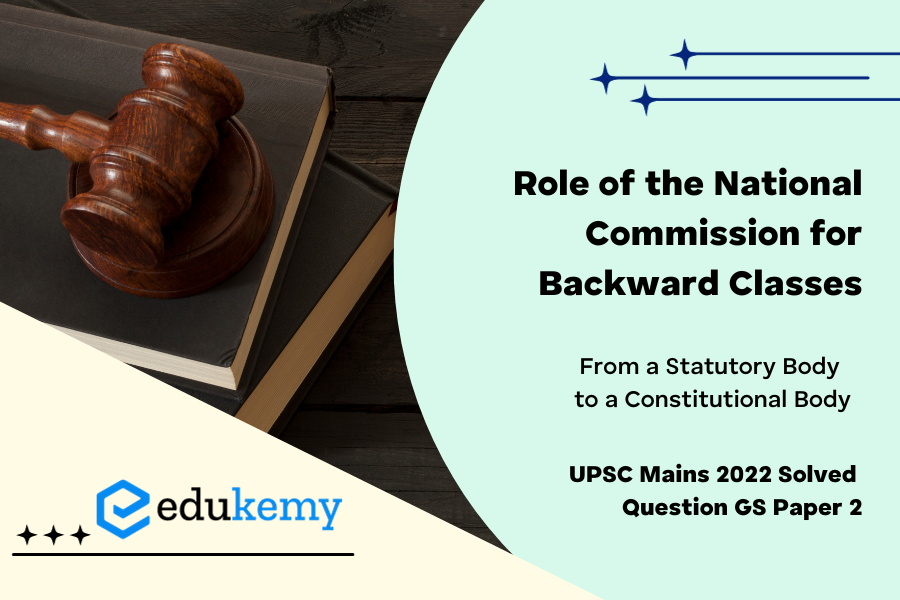The National Commission for Backward Classes (NCBC) played a pivotal role as a statutory body in recommending the inclusion or exclusion of communities in the backward classes list. Its transition to a constitutional body fortified its authority, ensuring greater autonomy, and enabling it to safeguard the interests of marginalized communities effectively, thus fostering inclusive growth and societal harmony.
UPSC Mains General Studies Paper – 2 Mains 2022
UPSC Mains Civil Services IAS Exam Question Paper – 2022
Contents
Approach
- Introduce, with keywords, the National Commission for Backward Classes (NCBC) as a constitutional body.
- Brief the journey transformation of NCBC from a statutory body to a constitutional body with objectives, functions and powers.
- Accordingly conclude with the major significance of NCBC.
Answer
Introduction
- 102nd Constitution Amendment Act, 2018 provided constitutional status to the National Commission for Backward Classes (NCBC). It has the authority to examine complaints and welfare measures regarding socially and educationally backward classes.
- Previously NCBC was a statutory body under the Ministry of Social Justice and Empowerment.
Body
Two Backward Class Commissions were appointed in 1950s and 1970s under Kaka Kalelkar and B.P. Mandal respectively. Prior to its transformation into a constitutional body, the NCBC was a statutory body that was established in 1993 under the National Commission for Backward Classes Act, 1993.

- The Commission consists of five members including a Chairperson, Vice-Chairperson and three other Members appointed by the President by warrant under his hand and seal.
- The conditions of service and tenure of office of the Chairperson, Vice-Chairperson and other Members is determined by the President.
- 102nd Constitution Amendment Act inserted new Articles 338 B and 342 A.
- The amendment also brings about changes in Article 366.
- Article 338B provides authority to NCBC to examine complaints and welfare measures regarding socially and educationally backward classes.
- Article 342 A empowers the President to specify socially and educationally backward classes in various states and union territories.
The commission investigates and monitors all matters relating to the safeguards provided for the socially and educationally backward classes under the Constitution or under any other law to evaluate the working of such safeguards.It participates and advises on the socio-economic development of the socially and educationally backward classes and to evaluate the progress of their development under the Union and any State.It presents to the President, annually and at such other times as the Commission may deem fit, reports upon the working of those safeguards. The President laid such reports before each House of Parliament.
The main role of the NCBC is to safeguard the interests of the socially and educationally backward classes (SEBCs) in India and to ensure that they receive the benefits and protections provided to them under the Constitution and other laws. The NCBC is also responsible for identifying the SEBCs and determining the criteria for their inclusion in the list of backward classes.
As a constitutional body, the NCBC has greater powers and autonomy compared to its previous status as a statutory body. It now has the same status as other constitutional bodies, such as the National Commission for Scheduled Castes (NCSC) and the National Commission for Scheduled Tribes (NCST), and is directly accountable to the Parliament.
Conclusion
The transformation of the NCBC into a constitutional body has given it greater powers and autonomy to discharge its duties and responsibilities effectively. It has also increased the transparency and accountability of the NCBC in its functioning and has provided a stronger legal framework for the protection of the rights and interests of the SEBCs in India. The government must put information in public domain regarding the findings of the caste census and recommendations of commission. Composition of commission should reflect the gender sensitivity and representation of stakeholders
In case you still have your doubts, contact us on 9811333901.
For UPSC Prelims Resources, Click here
For Daily Updates and Study Material:
Join our Telegram Channel – Edukemy for IAS
- 1. Learn through Videos – here
- 2. Be Exam Ready by Practicing Daily MCQs – here
- 3. Daily Newsletter – Get all your Current Affairs Covered – here
- 4. Mains Answer Writing Practice – here


